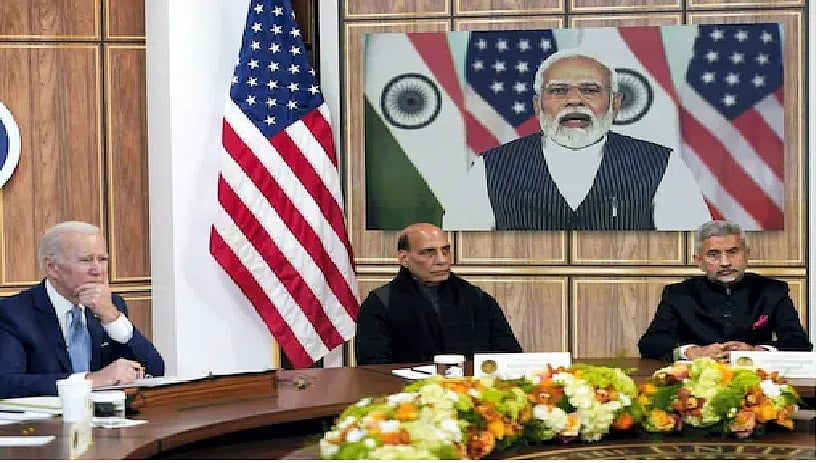On April 11, US President Joe Biden and Indian Prime Minister Narendra Modi held a virtual summit. Unusually, it took place minutes before the 2+2 ministerial meeting between the defence and foreign ministers of both nations. The Ukraine war, relegated to the subtext of the agenda, loomed large over the summit.
The US planned to cajole oblique compel at the highest level to alter India’s neutrality. President Biden had earlier publicly bemoaned India’s position as shaky over Ukraine. India has not condemned the Russian attack on Ukraine and abstained in multiple votes at the United Nations.
The “readout” by the White House post-meeting reveals the issues discussed as cooperation in clean energy, technology, and defence besides expanded economic relations and people-to-people ties. Under the rubric of bilateral and multilateral cooperation, it talks of ending the Covid pandemic, strengthening the global health sector, and advancing global food security. As the two largest democracies, it reiterates respect for sovereignty and territorial integrity of “all nations," a core principle in the UN Charter. But then adds that this must apply “in the Indo-Pacific and beyond." This underlines the dichotomy in India’s approach. In the Indo-Pacific, India embraces the principle to counter China, but in Ukraine it is ambivalent.
The US realises that weaning India away from its default position of neutrality on conflicts not directly affecting it is trying. To suspend Russia’s membership in the UN Human Rights Council, members voted 93 to 24, with 58 abstentions. Even NATO member Turkey so voted as it buys 41% of its gas from Russia and has its citizens stuck in Mariupol, under Russian bombing. The Economist calculates that nations that opposed or abstained together account for a quarter of the world’s GDP and 20% of its exports. But they can absorb only a quarter of Russian exports, consisting of oil and gas, arms, fertiliser, and diamonds. Thus geo-economics and geo-politics mismatch.
The US State Department issued its Report on Human Rights practices for 2021 on the day of the summit. Could be a coincidence or a deliberate poke. It specifies in India “unlawful and arbitrary killings” besides arbitrary arrests and attacks on freedom of expression and journalists. The recent stopping of journalists Rana Ayub and Aakar Patel at the airport only supplement that impression. Push by progressive lawmakers in the US Congress, mainly Democrats keeps the focus on the Modi government’s behaviour at home. Congresswoman Ilhan Omar pointedly asked at a hearing: “How much does the Modi government have to criminalise the act of being Muslim for us to say something?”
In February Rashad Hussain, the US ambassador at large for international religious freedom commented in the context of the hijab controversy that “Religious freedom includes the ability to choose one’s religious attire." Minister S. Jaishankar was provoked by all this and a remark by US Secretary of State Antony Blinken that they were monitoring India, “including a rise in human rights abuses." In response, he muttered that India too could pose questions about the US record in this regard.
It seems that basically, the US has accepted that India cannot cut off trade, defence, and energy relations with Russia overnight. They were seeking assurances that India would not sharply increase oil imports, tempted by discounted sales. The objective is to not provide Russia with psychological and financial relief by having alternative markets in lieu of Europe.
However, the US has faced resistance in third-world countries as well. Many have old ties with Russia. There are also local factors. Iraq abstained citing “historical background”. UAE and Saudi Arabia are unhappy about US-Iran parleys besides requiring Russia for their OPEC+ strategy to boost the oil price. As regards Africa, 25 of 54 nations did not align with the US. Pakistan’s army did a convenient flip, back to supporting the US, even ensuring the sack of a US-baiting prime minister Imran Khan, who was in Russian President Vladimir Putin’s parlour as the Ukraine war was launched.
India has reverted to the time-tested neutral position when two friends are at war. It is nonalignment, but those in power hate that word for its Nehruvian legacy. That was India’s stance throughout the Iran-Iraq war. But it is different now. One, the use of force to settle differences with a smaller but democratic neighbour is completely untenable. Two, evidence emerging about the execution-style killing of civilians in Bucha, etc. is indefensible. Simply echoing the Russian demand of an enquiry without naming a clear suspect is moral bankruptcy. Three, India needs the US, European Union, and its QUAD partners Australia and Japan for propelling India into a higher growth path. Russia is the past and a shrinking power with a falling population. Four, BJP’s worsening anti-Muslim behaviour shrinks its credibility as a democratic bulwark against China.
Minister Jaishankar, caught between the sharpened bigotry of his new political patrons the BJP, and the diplomatic demarches of India’s newest best friend the US, would need more than repartee to guide India. Russian brutality will only mount to obtain what Putin can market as a Russian victory.
The writer is former secretary, Ministry of External Affairs
Time-tested neutral position on trial, writes K C Singh
The US realises that weaning India away from its default position of neutrality on conflicts not directly affecting it is trying.
K C SinghUpdated: Saturday, April 16, 2022, 07:54 AM IST

Time-tested neutral position on trial, writes K C Singh | Photo: AFP/PTI